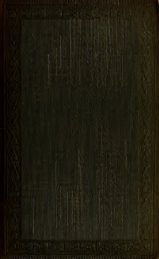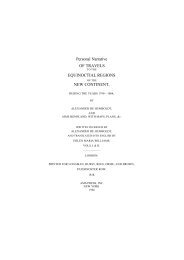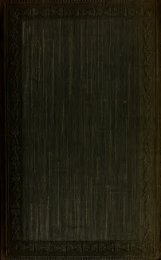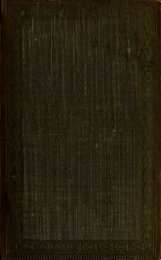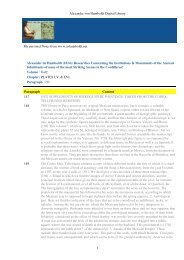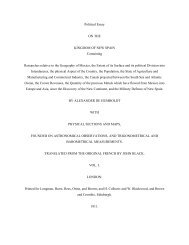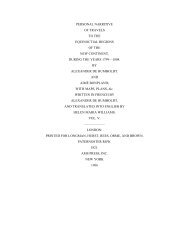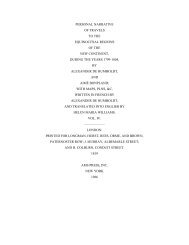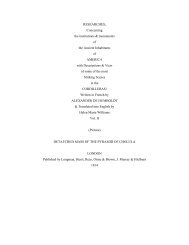See the complete document here
See the complete document here
See the complete document here
You also want an ePaper? Increase the reach of your titles
YUMPU automatically turns print PDFs into web optimized ePapers that Google loves.
*H6 COSMOS.<br />
never<strong>the</strong>less, <strong>the</strong> zoological history of Avieuma, in tne possession<br />
of <strong>the</strong> Royal Library at Paris, differs from Aristotle's<br />
work on <strong>the</strong> same subject.* As a botanist, we must name<br />
Ibn-Baithar of Malaga, whose travels in Greece, Persia, India,<br />
and Egypt entitle him to be regarded with admiration<br />
lor <strong>the</strong> tendency he evinced to compare toge<strong>the</strong>r, by independent<br />
observations, <strong>the</strong> productions of different zones in <strong>the</strong> East<br />
and West.t The point from whence all <strong>the</strong>se efforts emanated<br />
was <strong>the</strong> study of medicine, by which <strong>the</strong> Arabs long<br />
ruled <strong>the</strong> Christian schools, and for <strong>the</strong> more perfect development<br />
of wlych Ibn-Sina (Avicenna), a native of Aschena, near<br />
Bokhara, Iba-Pi.oschd ( Averroes) of Cordova, <strong>the</strong> younger Sera-<br />
pion of Syria, and Mesne of Maridin on <strong>the</strong> Euphrates, availed<br />
<strong>the</strong>mselves of all <strong>the</strong> means yielded by <strong>the</strong> Arabian caravan<br />
and sea trade. I have purposely enumerated <strong>the</strong> widelyremoved<br />
birth-places of celebrated Arabian literati, since <strong>the</strong>y<br />
are calculated to remind us of <strong>the</strong> great area over which <strong>the</strong><br />
of <strong>the</strong><br />
peculiar ro*Mital direction and <strong>the</strong> simultaneous activity<br />
Arabian race extended <strong>the</strong> sp<strong>here</strong> of ideas.<br />
The scientific knowledge of a more anciently-civilized race<br />
—<strong>the</strong> Iirliaus—was also drawn wdthin this circle, when, un-<br />
couth strHeij to attain to a more intimate acquaintance with science,<br />
although <strong>the</strong> cares of government have withdrawn us from it ; we have<br />
delighted in spending our time in <strong>the</strong> careful readingofexcelle^it works,<br />
in order that our soul might be enlightened and streng<strong>the</strong>ned by exer-<br />
cise, vnihout which <strong>the</strong> life of man is wanting both in nile and in freedom<br />
(at animae clarius vigeat instrumentum in acquisitione scientise,<br />
sine mortalium vita uon '^j^ua regitur liberaliter). Libros ipsos taraquam<br />
pra^riium amici Caesaris gratulantur accipite, et ipsos antiquis philosopbor<br />
im operibus, qui vocis vestrae ministerio reviviscuut, aggregantes<br />
in aiditorio vestro." (Compare Jom'dain, p. 169-178, and Friedrich<br />
vou Raumer's excellent work Geschichte dei Hohenstaufen, bd. iii,,<br />
184', s. 413.) The Arabs have served as a uniting link between ancier<br />
t and modern science. If it had not been for <strong>the</strong>m and <strong>the</strong>ir love<br />
of 1 'anslation, a great portion of that which <strong>the</strong> Greeks had ei<strong>the</strong>r<br />
forned <strong>the</strong>mselves, or derived from o<strong>the</strong>r nations, would have been<br />
lost Vo succeeding ages.<br />
It is when considered from this point of view<br />
that ^he subjects which have been touched upon, though apparently<br />
m-2rely linguistic, acquire general cosmical interest.<br />
*<br />
Jourdain, in his Traductions cTAristote, p. 135-138, and Schneider,<br />
AdnM. ad Aristotelis de Animalibus Hist., lib. ix., cap. 15, speak of Michael<br />
Scot's translation of Aristotle's Historia Animalium, and of a sim-<br />
ilar work by Avicenna (Manuscript No. 6493, in <strong>the</strong> Paris Library).<br />
t On Ibn-Baithar, see Sprengel, Gesch. der Arzneykunde, th. ii., 1823,<br />
s. 468; and Royle, On <strong>the</strong> Antiquity of Hindoo Medicine, p. 28. We<br />
have possessed, since 1840, a German translation of Ibu-Baithar, undei<br />
<strong>the</strong> title Grosse Zusammens!ellmig uher die Krdfte dcr bekannten ein<br />
fachen Heil- nnd Nahrungs-mittel, translated from <strong>the</strong> Arabic by J. v<br />
Boa<strong>the</strong>'irer, 2 baudes.



